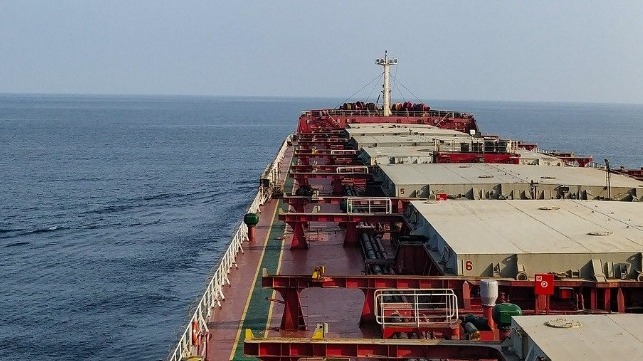Charterparty Risks: A Vessel Description "Without Guarantee"

In time charterparties, shipowners will warrant the capabilities of the vessel, including its speed and fuel consumption. It is quite common for the charterparties to have a “vessel description” clause that will set out the speed-consumption warranty. In the case of charterparties in NYPE 1946 form, the most widely used form for dry cargo time charters, one often finds a rider clause containing the vessel description.
Sometimes, the “vessel description” clause will be qualified with the words “without guarantee,” or “WOG.” The effect of the WOG qualification has been deliberated in several cases. Some of these precedents are discussed below, followed by the negotiation techniques employed by the charterers and owners.
History and trends
In Japy Fréres and Co v RWJ Sutherland and Co, decided in 1921, the vessel was described as capable of carrying 600 tons “without guarantee.” Judge Scrutton LJ held that the WOG qualification deprived the clause of any effect as a warranty. Hence, a damages claim for breach of the clause cannot be founded. However, his lordship acknowledged, though not decisively, that the untruthfulness of the description can be a reason for the charterer to rescind the charterparty.
A similar decision was reached in The Lendoudis Evangelos II, decided in 1997. In this case, it was a time charter for a trip. The charterparty stated the duration of the trip as “duration about 70/80 days without guarantee.” The charterer redelivered the vessel in about 113 days. Judge Longmore J held that the shipowners had no claim for late redelivery, as the WOG qualification deprived the clause of any contractual effect. His lordship found that it would make no difference even if the charterer unreasonably estimated the duration when stating “about 70/80 days” in the charterparty. However, his lordship pointed out that there will be an action if, and only if, the statement was made in bad faith. Proving the bad faith is an uphill task for the charterer.
These decisions were followed by Andrew Smith J in The Lipa, decided in 2001, in the context of an underperformance claim based on a vessel description clause. In this case, a vessel description rider clause was added to the BIMCO BALTIME 1939 form, and it included a statement of the vessel’s speed-consumption capability. At the end of the clause, it was added that “All details 'about' – all details given in good faith but without guarantee.” The charterer claimed that the vessel overconsumed. Andrew Smith J held that the WOG qualification rendered the speed-consumption statement not a warranty. He held that a claim can be made in such circumstances only if the statement was not made in good faith, which was not the case here.
Negotiation Techniques
In practice, what the charterers do to mitigate the dilemma of WOG qualification is to avoid having it in the charterparty, so long as the charterer has the bargaining power. The common ground put forward by charterers is that the speed-consumption qualified by “about” or “double about,” as is often the case, already protects the shipowner by giving them a safe margin on the speed-consumption description (usually of 0.5 knots on the speed and five percent on the consumption).
The speed-consumption warranty is typically about the vessel’s capability in good weather conditions. In recent years, it has become a common practice for the shipowners to implant an onerous condition that the good weather capability of the vessel must be established by the vessel’s performance over a consecutive 24-hour good weather period, which can be so hard to get that the performance warranty is effectless. Such an express provision will overcome the effect of The Ocean Virgo decided in 2015, where Teare J held that a vessel’s good weather performance capability can be established by her performance in good weather conditions over a sufficient period – and that this can be less than 24 hours (noon-to-noon report).
Future changes
Japy Fréres was decided at a time when the UK Misrepresentation Act 1967 was not in place. Although The Lendoudis Evangelos II and The Lipa were decided when the Act was in force, the Act was not considered in these two cases. The same is true of London Arbitration 4/18. Sec 2(1) of the Act renders a party liable for negligent misrepresentation. It puts the burden on the party who misrepresented a fact if he is to avoid liability, to prove “that he had reasonable ground to believe and did believe up to the time the contract was made the facts represented were true”.
If the WOG qualification does not dilute the value of the description as a representation of fact, then Sec 2(1) will likely render the shipowner liable for the untruthfulness of the description unless the shipowner proves that it stated the description on reasonable ground. However, the value of a vessel description clause qualified with WOG as a representation of fact for the purpose of Sec 2(1) is yet to be tested in court, and it is yet to be seen what the section’s impact will be on such qualified vessel description. That leads to a conclusion that there can be some uncertainty associated with the future of WOG qualifications.
Dr. Arun Kasi is an advocate and solicitor in Malaysia. He specializes in charter disputes arbitration under the terms of LMAA and SCMA. He is the author of The Law of Carriage of Goods by Sea (Springer: 2021). For more information, visit https://arunkasico.com.
Dr. Kasi extends his thanks to Mr. Prokopis Krikris, Claims Manager at Meadway Bulkers Athens for bringing up the points made out in Future section, and to Mr. Julius Posselt, Head of Ops-Claims Dept. at Oldendorff Carriers Singapore, for the points made out in Negotiation Techniques.
The opinions expressed herein are the author's and not necessarily those of The Maritime Executive.
